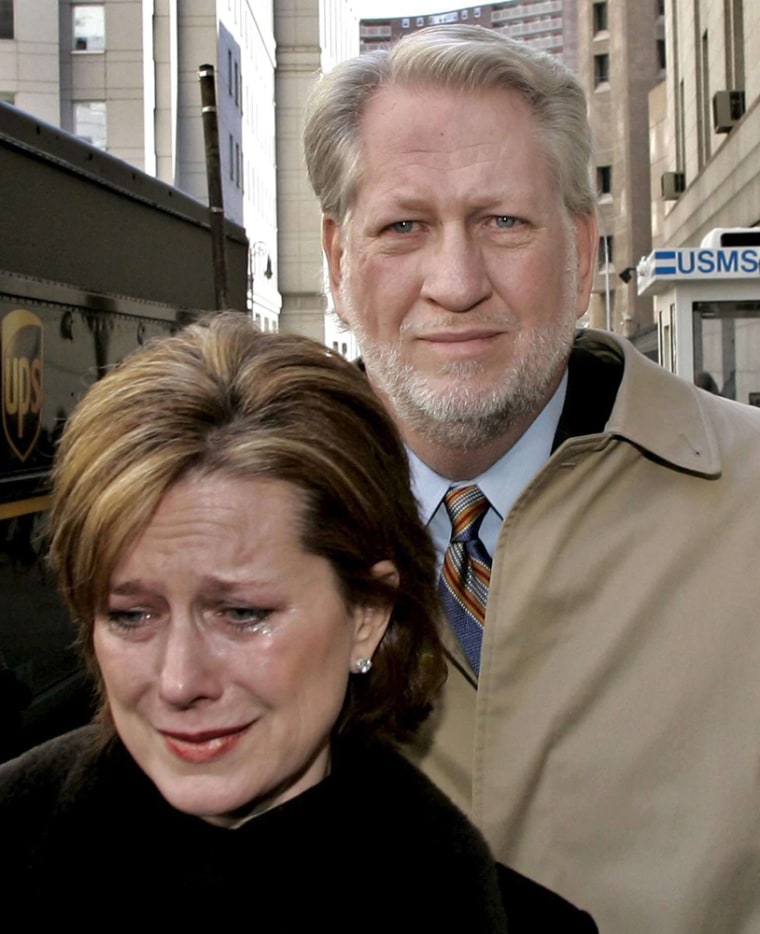Former WorldCom Chief Executive Bernard Ebbers, who built a small Mississippi-based long distance company into a telecommunications powerhouse, was found guilty Tuesday of directing the biggest accounting fraud in corporate history, leaving thousands of investors empty-handed.
A federal jury in Manhattan deliberated eight days before dismissing Ebbers’ testimony that he knew nothing about the details behind the $11 billion securities fraud, which drove the company into the nation's largest corporate bankruptcy in 2002.
The jury convicted him on all charges — one count of conspiracy, one count of securities fraud and seven counts of false regulatory filings. Ebbers, 63, could face up to 85 years in prison.
The tall, bearded Ebbers, who worked as a bouncer, basketball coach and milkman before getting into the telecommunications business, sat with his hands folded as the verdict was read and showed little reaction. He then turned to hug his wife, who was crying.
Ebbers made no comment as he left the courthouse, but his attorney Reid Weingarten vowed to appeal.
“The fight will continue,” Weingarten said, adding that the case was “riddled with reasonable doubt.” When asked for his client's reaction to the verdict, Weingarten said, “I’m sure he’s devastated.”
The conviction came more than two years after an internal auditor began asking questions about curious accounting at WorldCom, touching off a scandal that eventually unearthed $11 billion in erroneously declared revenues and expenses.
Prosecution testimony at the six-week trial portrayed Ebbers as obsessed with keeping WorldCom’s stock price high and panicked about $400 million in personal loans that were backed by his shares in the company.
Ebbers gambled by taking the witness stand late in the trial, insisting he was unfamiliar with the details of accounting and knew nothing about the fraud taking place on his watch. Others described him as a brusque and exacting executive, known to toss unprepared underlings from meetings and count parked cars at night to see how many people were working late.
But he could also be a charming and folksy CEO, who preferred cowboy boots to suits, opened shareholder meetings with a prayer, ate lunch in the cafeteria and ran a company that had become a Wall Street darling by the late 1990s.
The conviction completes a staggering fall for Ebbers, who took his small telephone company and acquired ever-larger rivals, making him a Wall Street superstar and earning him the nickname "Telecom Cowboy."
He was badly damaged by testimony from his former finance chief Scott Sullivan, who claimed Ebbers repeatedly ordered him to “hit our numbers” — a command, Sullivan said, to falsify the books to meet Wall Street expectations.
Sullivan, who pleaded guilty to fraud, admitted he essentially masterminded the scheme — but said he did it on the clear instructions of Ebbers, who ignored his repeated pleas that the adjustments were wrong.
With the entire telecom industry suffering a dot-com hangover, the fraud was driven by soaring “line costs” — the fees WorldCom paid to smaller local telephone carriers to use their networks.
Prosecutors said the fraud stretched from late 2000 until early 2002, sometimes amounting to nearly $1 billion per quarter in hidden expenses and improperly recognized revenue.
Pressure from the loans, the money he stood to lose and the power of the CEO’s job combined to form a “perfect storm of corruption” that drove Ebbers to commit fraud, prosecutor William Johnson said in his closing argument.
“He was WorldCom, and WorldCom was Ebbers,” the prosecutor told jurors. “He built the company. He ran it. Of course he directed this fraud.”
Ebbers disputed the testimony of Sullivan, saying he became aware of the fraud only in the summer of 2002, after he was asked to leave WorldCom.
“He’s never told me he made an entry that wasn’t right,” Ebbers said of Sullivan. “If he had, we wouldn’t be here today.”
Attorney General Alberto Gonzales hailed the verdict as "a triumph of our legal system and the application of our nation’s laws against those who breach them."
“We are satisfied the jury saw what we did in this case: that fraud at WorldCom extended from the middle-management levels of this company, all the way to its top executive," Gonzales said in a statement.
Weingarten said his appeal would focus on three former WorldCom executives whom the defense wanted to bring as witnesses but could not, because prosecutors refused to grant immunity.
Weingarten repeatedly asked U.S. District Judge Barbara Jones to grant the immunity herself, an unusual step for judges, and she declined.
Without hearing from the three witnesses, including former chief operating officer Ron Beaumont, the jury did not have the full story of the massive accounting fraud, Weingarten said. “That would have been powerful exculpatory evidence,” he said.
Still, federal appeals courts are extremely wary of overturning jury verdicts, and legal experts said after the verdict that Ebbers faced a decidedly uphill battle.
“That is a tough issue to win on appeal,” said Bradford Lewis, who specializes in white-collar crimes at the San Francisco firm Fenwick & West. “The courts give prosecutors relatively broad discretion in their choices as to whom to grant immunity.”
There was no immediate comment from any of the jurors in the case. Jones offered jurors the chance to speak to reporters, but none accepted, and the judge instructed reporters not to badger the jury.
Ebbers still faces civil litigation, including from the company, now known as MCI Inc., which backed up his $400 million in personal loans.
The company struck a $750 million settlement with federal regulators to repay aggrieved investors, a small sum compared to the tens of billions of dollars of market capitalization that evaporated in the scandal.
Twelve former directors of the company, plus some investment banks that underwrote WorldCom securities and auditing firm Arthur Andersen, also face a lawsuit brought by angry investors. A trial in that case is set to begin this month.
